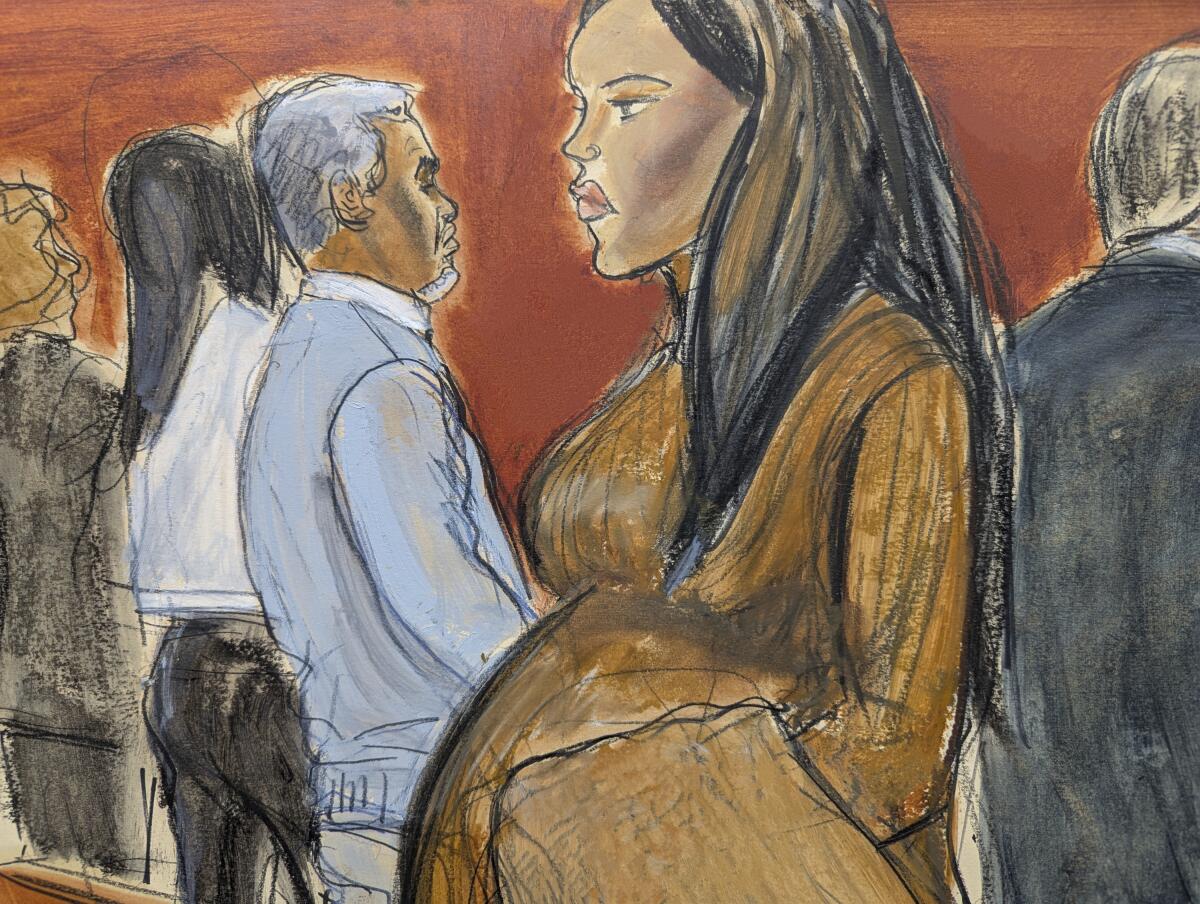At Sean ‘Diddy’ Combs trial, the women testifying are on trial too

- Share via
Did she scream? Was it loud enough? Was her dress torn enough to prove she fought?
These were some of the questions faced by 17-year-old Lanah Sawyer in 1793 during one of America’s first rape trials, which ended in an acquittal for the wealthy “rake” who assaulted the teenager.
As Week 4 ends in the sex trafficking and racketeering trial of Sean “Diddy” Combs, it’s becoming depressingly clear that the more things change, the more they remain the same — especially when it comes to how we treat survivors of sexual violence. Despite almost a decade of the #MeToo movement, the women testifying against Combs are on trial just as much as he is, and just as much as Sawyer was 232 years ago.
Why didn’t they leave? Why did they text Diddy friendly notes? Isn’t this all just about cashing in?
Once again, women are being asked to explain not just what happened to them, but why they reacted the way they did. It’s our collective ongoing need to police and scrutinize how women react to trauma, while steadfastly refusing to learn anything about trauma.
For a lot of folks, there is a perceived right way to react to sexual violence — crying, begging, pleading, running, fighting, shouting really loud, reporting it to police immediately. If a woman fails to conform to these narrow, male-approved reactions, well, they must be lying — or willing.
Case in point, Bill Maher’s recent unfunny rant about Cassie Ventura, the woman at the center of the Diddy allegations.
Maher, in a monologue as ignorant as it was self-assured, argued that he could understand why women in the past were hesitant to come forward with allegations of abuse and instead may have thought, “If I can’t get justice for my pain, can I at least get a receipt, a coupon?”
So dismissive of the real barriers women continue to face in the legal system to assume greed is why women sometimes seek civil penalties instead of criminal ones; so disingenuously classist to throw “coupon” in there, an unsubtle nod to the stereotype that victims are poor and opportunistic.
Sadly, Maher is far from the only one to attack Ventura. President Trump, who has been found civilly liable for the sexual assault of E. Jean Carroll, went so far as to hold out the chance of a pardon for Combs if he was convicted.
Maher went on to say that “things have changed enough” that women should be expected to immediately report any abuse or assaults.
“(D)on’t tell me any more about your contemporaneous account that you said to two friends 10 years ago, tell the police right away,” he lectured. “Don’t wait a decade. Don’t journal about it. Don’t turn it into a one woman show and most importantly, don’t keep f— him.”
California First Partner Jennifer Siebel Newsom took the stand Monday in the rape trial of Harvey Weinstein, putting herself in a position no woman asks for -- and helping all women in the process.
Ami Carpenter, an assistant professor at the Joan B. Kroc School of Peace Studies at University of San Diego and an expert in trafficking, told me she doesn’t agree with Maher, to put it gently.
“We have a tendency to think of victims as either deserving or undeserving of care and compassion,” she told me. And a lot of that depends on the way they present themselves.
In Ventura’s instance, and perhaps some of the other women who have testified against Combs, the alleged abuse went on for years. It’s likely that she and others had a trauma bond with Diddy, as do many survivors of long-term sexual violence, whether through sex trafficking or intimate partner abuse.
Although MAGA immigrant panic has sold us the image of traffickers being Latino cartel members sneaking girls and boys across borders, the reality is most victims are right here in the United States and know — and at one point maybe even trust — their trafficker. It’s a friend, a mentor, a guy who offers protection from an otherwise difficult life. A person like Combs, with power and money and promises of a better life.
And only after the relationship is formed does the trafficking start, with the abuser cycling “between abusive behavior and displays of affection or remorse,” Carpenter said, often leading the victim to a confusing, paralyzing mix of emotions that can include “sympathy, compassion and even love for the abuser.” Because that is what the abuser wants.
In a 2016 study, Carpenter talked to 65 sex traffickers in the San Diego area about how they controlled their victims.
“They all, to a person, understood how to create this psychological connection to their victim,” she said. “In fact, they looked down on traffickers or pimps who, in their words, had to resort to violence because they didn’t know the power of their words. For them, it’s all manipulation, a mental manipulation. And if I extrapolate from that, and I look at Diddy’s behavior, I think it could point to him being aware of what he was doing, acutely aware.”
Dr. Stephanie Richard, a law professor at Loyola Law School and the director of its Sunita Jain Anti-Trafficking Policy Initiative, told me that although fight or flight is the way most people think of resisting abuse or violence, freezing and fawning are common trauma responses as well — and ones that those trapped in long-term abuse often rely on for survival.
“A lot of victims realize that they won’t be harmed if they’re fawning,” Richard said. “And so these kind of responses are someone trying to keep them safe, because we’re all human, and you can’t live through something so terrible without doing things that protect yourself.”
Like agreeing with the abuser, or even sending them approving texts. Along with Ventura, at least three other women have testified against Combs or are expected to. Two, “Mia” and “Jane,” are attempting to remain anonymous, though Mia has already been outed. A third, Bryana Bongolan, a friend of Ventura’s, testified that Combs once held her up over a balcony railing, leaving her in fear of her life, before throwing her onto nearby patio furniture.
During her cross-examination by Combs’ lawyers, Mia was grilled for hours about her friendly texts with Combs, and whether the abuse had really happened. Attempting to discredit testimony that Combs had once slammed her arm in a door, the defense attorney asked whether she had screamed. Sound familiar?
In the end, Mia explained her behavior with seven words that any survivor will understand: “When he was happy, I was safe,” she testified.
And that’s really what it comes down to for all women: a sense of safety.
Whether inside a courtroom, online, in the media or in common society, until women are certain they can be safe when they speak up — from their abuser and from the rest of us — they are trapped explaining how they survived, not just what they survived.
Isn’t it enough that they did, and that they’ve found the courage to try to stop that same pain from being inflicted on someone else?
More to Read
Insights
L.A. Times Insights delivers AI-generated analysis on Voices content to offer all points of view. Insights does not appear on any news articles.
Viewpoint
Sign up for Essential California
The most important California stories and recommendations in your inbox every morning.
You may occasionally receive promotional content from the Los Angeles Times.















